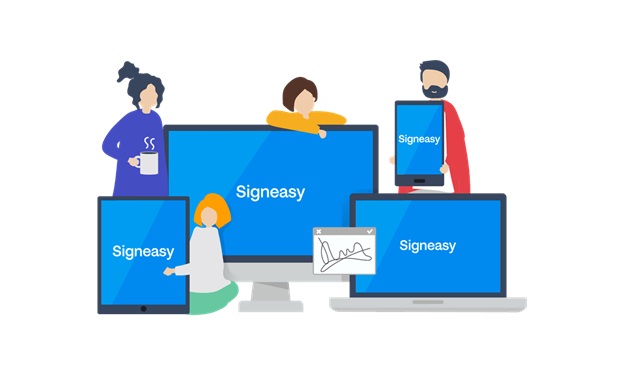In today’s digital age, how we conduct business and manage personal transactions has significantly transformed. Traditional paper-based signatures are making way for their digital counterparts, thanks to the emergence of signature-maker apps. These apps are revolutionizing how we authenticate documents and transactions, making the process more efficient, secure, and convenient.
In this blog post, we’ll explore the evolution of signature maker apps and their pivotal role in modernizing signatures for the digital era.
The traditional signature vs. electronic signatures
Before we delve into the world of signature maker apps, let’s briefly consider the traditional paper-based signature. For centuries, a person’s handwritten signature (also known as a wet signature) has been a symbol of identity and commitment on various documents, contracts, and agreements. While these signatures carry a sense of personal touch and authenticity, they also come with limitations.
Disadvantages of traditional signatures
- Physical presence: A person must be physically present to sign a document, which can be inconvenient, especially in a globalized world.
- Tangibility: Traditional signatures are susceptible to forgery, and it can be challenging to verify their authenticity.
- Paper usage: The process involves printing, signing, and storing physical copies, which is environmentally unfriendly and costly.
Enter electronic signatures:
Electronic signatures emerged as a modern alternative to traditional signatures. They offer several advantages over their paper-based counterparts:
- Convenience: Electronic signatures allow individuals and businesses to sign documents from anywhere with an internet connection.
- Security: They have built-in encryption and authentication mechanisms, making them highly secure.
- Efficiency: The digital process reduces the time and resources required for document signing.
The rise of signature maker apps
The shift from traditional signatures to digital signatures was the first step in modernizing the authentication process. However, the real game-changer was the development of signature maker apps. These apps are designed to simplify and streamline the creation of electronic signatures, making them accessible to everyone.
Signature maker apps are software tools specifically designed for creating electronic signatures. They provide users with a range of features and customization options to craft unique digital signatures that reflect their identity and style. These apps have gained popularity across various sectors, including business, legal, and personal use.
Benefits and applications
Signature maker apps offer a plethora of benefits, which is why they have become indispensable in the digital era.
Advantages of signature maker apps
- Convenience and accessibility: These apps can be accessed from smartphones, tablets, or desktops, allowing users to sign documents anytime, anywhere.
- Security and authentication: They incorporate security features such as encryption and authentication, making it extremely difficult for unauthorized parties to tamper with signatures.
- Efficiency and paper reduction: Signature maker apps streamline workflows, reducing the need for physical paperwork and storage space.
Applications of signature maker apps
- Business contracts and agreements: Businesses use signature maker apps to facilitate contract signing, speeding up negotiations, and reducing administrative overhead.
- Legal documents and compliance: Law firms and legal professionals use these apps to ensure compliance with eSignature laws while maintaining document integrity.
- Personal use: Individuals can employ signature maker apps to add a personal touch to emails, documents, and even digital artwork.
Types of signature maker apps
Signature maker apps come in various forms to cater to different user preferences and requirements. Here’s a breakdown of the types of signature maker apps available:
1. Mobile apps for on-the-go signing
These apps are designed for users who need the flexibility to sign documents while on the move. They often include features like touchscreen signatures and photo uploads for easy integration.
2. Desktop applications for business use
Businesses prefer desktop applications for their robust feature sets and compatibility with existing software. These applications are often integrated with document management systems and CRM tools. This integration streamlines the entire document workflow process, from creation to signing and storage.
3. Cloud-based solutions for collaborative signing
Cloud-based signature maker apps are ideal for collaborative environments where multiple parties must sign the same document. They enable real-time tracking and collaboration, ensuring all stakeholders are on the same page.
User tips and best practices
While signature maker apps offer numerous advantages, users should be aware of best practices to make the most of these tools:
- Choose a reputable app: Select a well-established signature maker app, such as Signeasy, with a good track record for security and reliability.
- Protect your digital identity: Keep your login credentials secure and enable two-factor authentication to prevent unauthorized access.
- Check legal requirements: Ensure that your chosen app complies with eSignature laws and regulations applicable in your region or industry.
- Backup your signatures: Regularly backup your electronic signatures to prevent loss in case of device failure or data corruption.
- Educate yourself: Familiarize yourself with the app’s features so you can take full advantage of its capabilities.
Future trends
The world of signature maker apps is continuously evolving, and several trends are shaping its future:
- Biometric authentication: Expect to see more biometric authentication methods, such as fingerprint and facial recognition, integrated into signature maker apps for added security.
- AI-enhanced signatures: AI will play an increasingly significant role in generating digital signatures that mimic the user’s unique handwriting style.
- Blockchain for notarization: Blockchain technology may become a standard for notarizing digital documents, further enhancing their trustworthiness.
- Increased integration: Signature maker apps will likely integrate more with other software tools, offering a seamless document management experience.
Conclusion
In conclusion, signature-maker apps have emerged as powerful tools for modernizing signatures in the digital era. They offer numerous advantages, from convenience and security to efficiency and customization.
As technology advances, these apps will only become more versatile and integral to our digital workflows. Whether you’re a business looking to streamline your processes or an individual wanting to add a personal touch to your digital communications, signature maker apps have something to offer for everyone in the digital age.
As you explore the world of electronic signatures, remember to choose the right signature maker app that suits your needs, stay informed about legal requirements, and keep an eye on emerging trends that will shape the future of digital signatures.
Signeasy stands out as the best signature maker app, offering a seamless and user-friendly experience for creating secure electronic signatures, streamlining contract workflows, and ensuring compliance with eSignature laws. Its robust features and intuitive interface make it a top choice for businesses and individuals alike.
With Signeasy at your disposal, you can navigate the digital world with ease and confidence.













Comments